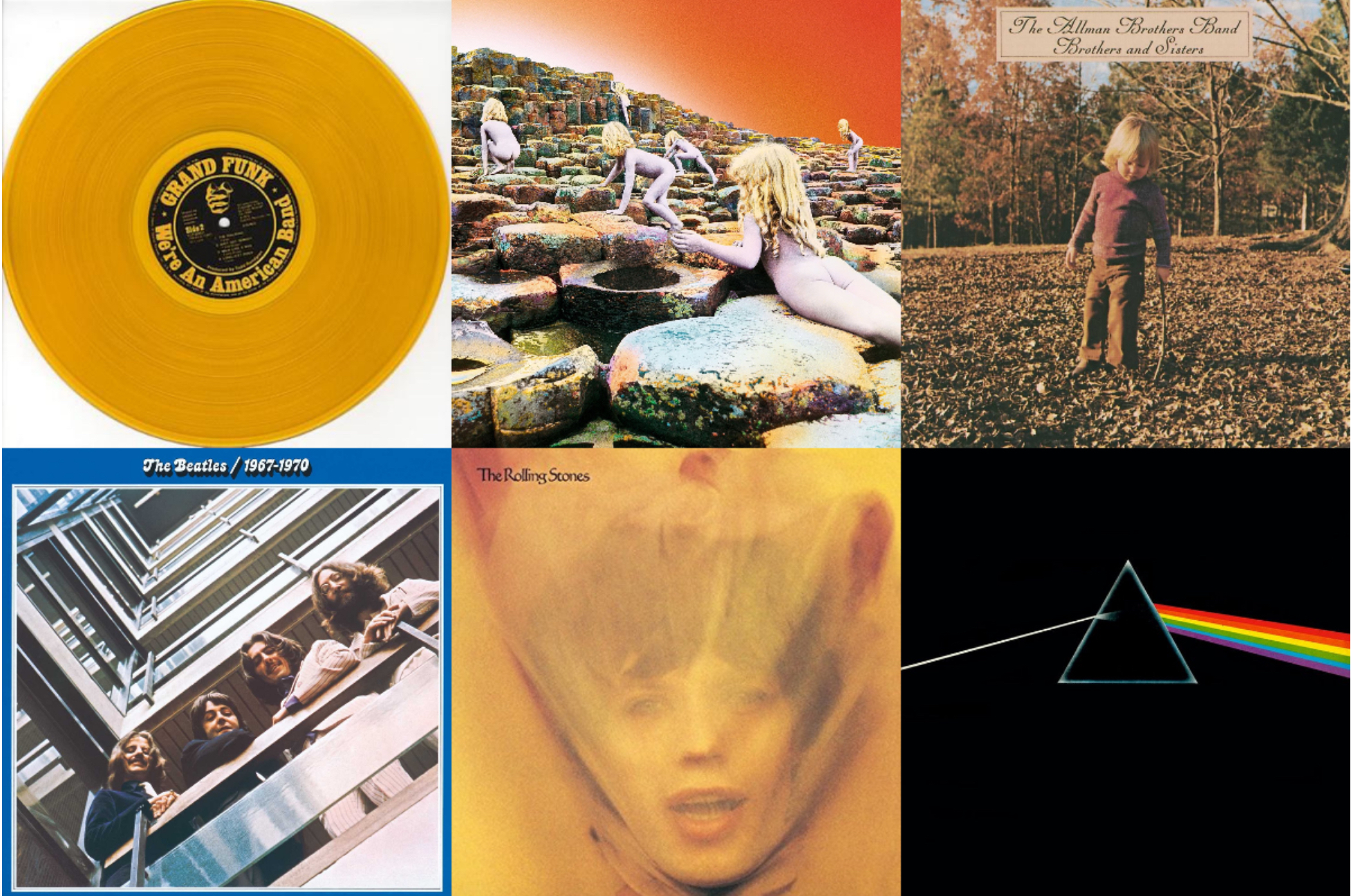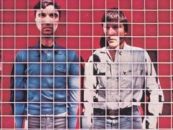Top Selling Albums of 1973: Come to the Dark Side
by Best Classic Bands Staff
Making headlines in 1973… CBS, feeling owning a Major League Baseball team didn’t belong as part of its core assets, sold the New York Yankees for $10 million to a group led by George Steinbrenner. It proved to be a good investment by the Cleveland shipbuilding magnate. In 2024, Forbes valued the club at $7.55 billion, up from $3.7 billion in 2017.
The final original episode of Rowan & Martin’s Laugh-In aired on March 12. Later that month, The Godfather won the Academy Award for Best Picture. Pablo Picasso died at age 91. Secretariat won horse racing’s Triple Crown.
In an “oh, by the way” moment, Pres. Richard Nixon’s attorney revealed the existence of an 18-and-a-half minute gap in a White House tape recording.
Recordings made by some of the biggest classic rock artists of the era dominated the list of 1973’s top-selling albums in the U.S. The chart, compiled by the former music industry trade magazine, Record World, features several all-time classics among the year’s Top 20 sellers, including legendary albums by Led Zeppelin, the Allman Brothers Band and Pink Floyd.
“Dueling Banjos,” featured in the heart pounding film drama Deliverance, was a #1 single on Record World. Somehow, enough people enjoyed it enough to buy an entire album’s worth of music from Eric Weissberg and Steve Mandell to make it the year’s #20 best seller.
Following the release of his hugely successful 1970 solo album, All Things Must Pass, George Harrison was extremely busy, his calendar filled with projects such as the Bangladesh concerts and film. In 1973, the follow-up arrived in the name of Living in the Material World. Both the album and its “Give Me Love (Give Me Peace on Earth)” topped the charts and was #19 for the year. [The album received an expanded edition in 2024, available in the U.S. here and in the U.K. here.]
In the 1970s, Elton John enjoyed a legendary run of success that yielded six #1 U.S. albums. One of them, Don’t Shoot Me, I’m Only the Piano Player yielded two big hits: “Crocodile Rock” and “Daniel,” which helped it place #18 overall.
From 1970 to 1974, Grand Funk Railroad released seven straight Top 10 albums. Thanks to its terrific title cut, We’re an American Band was the year’s #17 album.
Solo or with Wings, Paul McCartney earned five #1 albums between 1970 and 1976. Though only one single, “My Love,” was released from Red Rose Speedway, both the song and the album reached the top, the latter achieving #16 for the year.
The blues rock musician Edgar Winter had one of the more unlikely radio hits of the 1970s, with the instrumental smash, “Frankenstein.” It and the more conventional rock song, “Free Ride,” were included on the Edgar Winter Group’s They Only Come Out at Night album, helping it reach #15 for 1973. “Free Ride” was written and sung by the band’s Dan Hartman, who died in 1994 at just 43 years old.
Related: Winter talks about the making of the album and its monster hit
At just 23 years old, Stevie Wonder released his 16th album in a decade, Innervisions, playing nearly all of the instruments himself. It featured three hit singles: “Higher Ground,” “Living For the City” and “Don’t You Worry ’Bout a Thing,” and earned him his first of three Grammy Awards for Album of the Year. Innervisions was 1973’s #13 top seller.
A pair of Beatles compilations were released simultaneously in 1973. The so-called “Red Album,” officially called 1962-1966 compiled songs from their early years. It was a huge seller but its sales were eclipsed by the companion album, 1967-1970 (aka “The Blue Album”). The latter was #12 for the year; both remain steady sellers.
In a three-and-a-half year stretch, Chicago ran the table with five straight #1 albums. The second was 1973’s Chicago VI, which featured two of their numerous hits: “Feelin’ Stronger Every Day” and “Just You ‘n’ Me.” It was the year’s 9th biggest album.
Related: Which acts joined Chicago with #1 albums in 1973?
Not to be outdone, the Rolling Stones earned eight consecutive #1 studio LPs in the U.S. from 1971 to 1981. Goats Head Soup (#8 overall this year) was the third in that streak. It yielded two singles: “Angie” and “Doo Doo Doo Doo Doo (Heartbreaker)” which reached #1 and #15 in the U.S. respectively.
Related: What were 1973’s top radio hits?
Go figure… Every Led Zeppelin album from 1969’s II through 1979’s In Through the Out Door hit #1 in America, except for IV (which ironically has sold 23 million copies in the U.S. alone). 1973’s Houses of the Holy was #7 for the year.
Carly Simon‘s No Secrets was released in November 1972 but the massive success of its #1 hit, “You’re So Vain,” helped it become 1973’s #3 best seller.
Related: Here’s a different spin… 1973 in 50 classic rock albums
Though they were never Top 40 radio favorites, the format embraced the Allman Brothers Band‘s “Ramblin’ Man,” taking it all the way to #2. Its success made Brothers and Sisters their only #1 studio album (and the year’s #2 overall).
And at #1? Pink Floyd‘s true breakthrough, The Dark Side of the Moon. While their earlier albums were consistent Top 10 sellers in their native U.K., the group’s previous high water mark in the U.S. had topped out at just #46. DSOTM put them in a completely different league and it stayed on the Billboard albums chart for 741 straight weeks from 1973 to 1988. With worldwide sales of some 45 million copies, it is one of the best-selling albums ever. (Estimates put it behind only Michael Jackson’s Thriller and AC/DC’s Back in Black in worldwide sales.). (DSOTM‘s “Money” gave Floyd their first U.S. pop hit.)
Related: Our listings of 100s of classic rock tours
20. Deliverance (Orig. Soundtrack) (Warner Bros.)
19. Living in the Material World – George Harrison (Apple)
18. Don’t Shoot Me, I’m Only the Piano Player – Elton John (MCA)
17. We’re an American Band – Grand Funk (Capitol)
16. Red Rose Speedway – Paul McCartney and Wings (Apple)
15. They Only Come Out at Night – Edgar Winter Group (Epic)
14. Los Cochinos – Cheech Y Chong (Ode)
13. Innervisions – Stevie Wonder (Tamla)
12. The Beatles: 1967-70 (Apple)
11. Let’s Get it On – Marvin Gaye (Tamla)
10. Now & Then – Carpenters (A&M)
9. Chicago VI (Columbia)
8. Goat’s Head Soup – Rolling Stones (Rolling Stones)
7. Houses of the Holy – Led Zeppelin (Swan Song)
6. Rocky Mountain High – John Denver (RCA)
5. Lady Sings the Blues (Orig. Soundtrack) – Diana Ross (Motown)
4. No Secrets – Carly Simon (Elektra)
3. The World is a Ghetto – War (United Artists)
2. Brothers and Sisters – Allman Brothers Band (Capricorn)
1. The Dark Side of the Moon – Pink Floyd (Harvest)
Many recordings from 1973 are available in the U.S. here and in the U.K. here.






13 Comments so far
Jump into a conversationNo Wings Band On The Run, Ringo Ringo album, John’s Mind Games. Beatles 62-66
@ macca They were released too late in 1973 to make the list
You are incorrect in stating that “Angie” was the only single from the Rolling Stones’ “Goat’s Head Soup”. “Doo Doo Doo Doo Doo (Heartbreaker)” was released as the second single from the album and was also a big hit.
Right you are! We’ve made the change and fired the fact checker.
1972-3, David Bowie – Rise & Fall of Ziggy Stardust & the Spiders from Mars is nowhere on your charts? I actually knew that, but it’s still, IMO, the Greatest album ever made.
These are based on sales figures. A Passion Play must’ve not sold enough to crack the year’s Top 20.
You’ve quite clearly just made this list up or used some kind of inverse points total to give albums their placing. There is no way this is based on sales, either from 1973 (as no SALES lists were ever printed Billboards Top LPs of 73 is based on points for chart positions) and RIAA certified albums from that year, would have both 62-66 & 67-70 at 1 & 2 due being double sets and multipled at the RIAA. In reality DSOTM is #1, HOTH #2.
I’ve sent reader Martin the following response, via email, along with a screen grab of the actual page of the chart that was published in 1973:
The story clearly states the chart is based on the one compiled by Record World magazine, a longtime competitor of Billboard.
I worked at RW for many years, including 1 1/2 years in its chart department. The article accurately depicts what was published in the magazine’s 1973 year-end issue.
In my little universe, 1973 competes with 1971 as my favorite music year. People always talk about 1967 or 1969 as being better. Someone may believe they are better in quality, but certainly not in quantity of great albums.
Unbelievable – reading this article, I acknowledge I have everyone of these LPs from 1973.
What a great era for music – the uniqueness of each LP, the diversity of the artists’ approaches, and the creativeness, not the autotune and cookie cutter garbage (in general, with exceptions) of today.
From a certain standpoint, I have to disagree with a couple of you folks here. While I certainly agree there are some momentous and epic LPs included here, I see this cumulative grouping as the beginning of a general downward trend from what I would consider the peak era of what we consider “rock” music, and by that term I would include the many peripheral types of popular music that all melded into the mainstream of the “golden” era. Sure, the seventies had some wonderful music, but it also heralded the end of rock music for a time, and many of the bands with entries here, while certainly great, are on their last gasp of creating palatable recordings. I guess much of it depends on how old you are, and when you’re own “Golden Era” occurred. But the litmus test for me is that there are not many of these LPs, on this list, that I would be interested in playing today, where there are so many that I am still interested in, and continue to play today, from previous years.
You forgot “Billion Dollar Babies” & Al Green “Call Me”
hnklbn: The sales ranking here was compiled by Record World magazine. Neither of the albums you cited was in their Top 20 for the year.